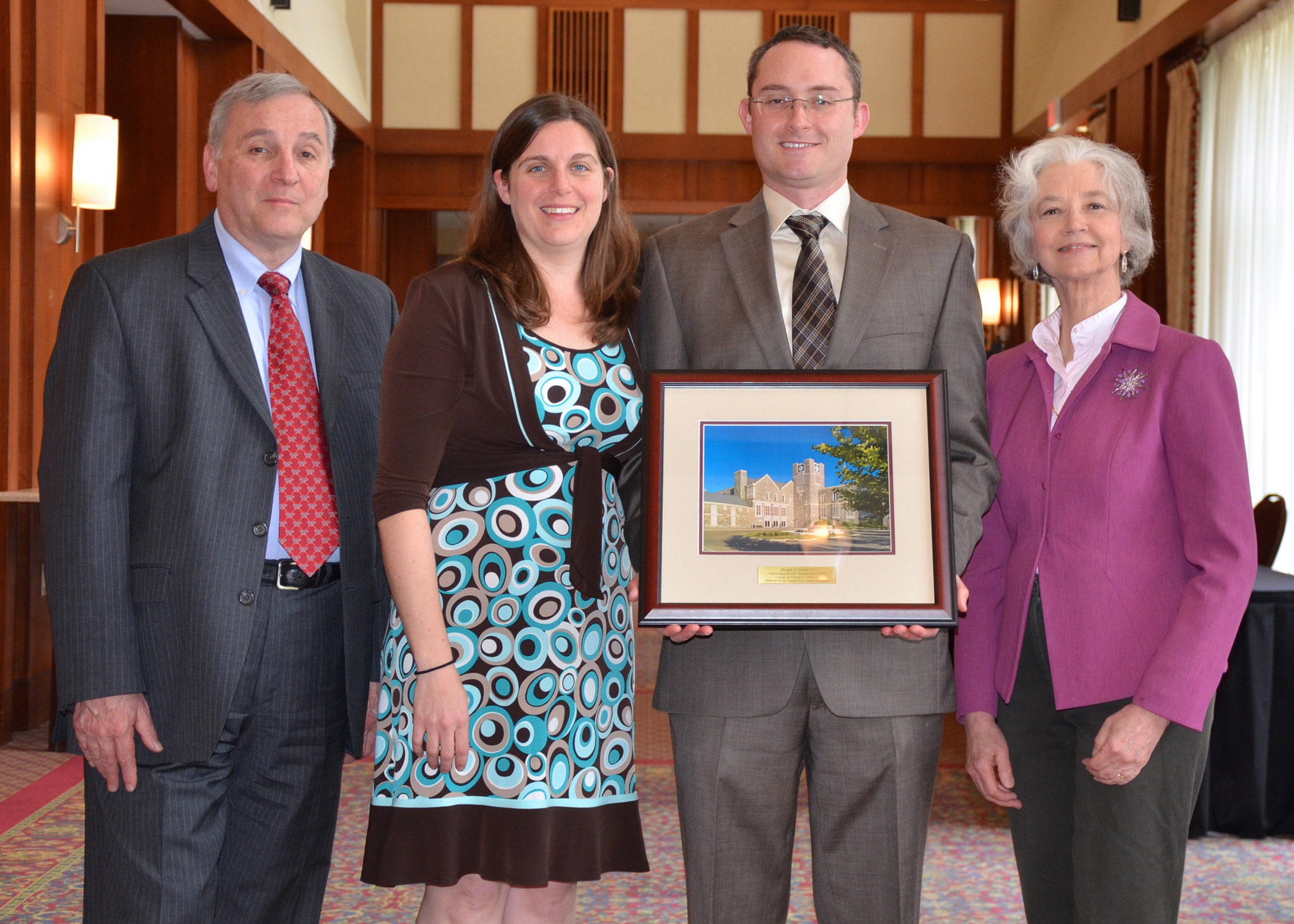Veterinary college names distinguished alumni award winners

The Virginia-Maryland College of Veterinary Medicine at Virginia Tech recognizes two former students with its Outstanding Recent Alumni Award and inaugural Lifetime Achievement Alumni Award.
Dr. Tom Cecere (DVM ’05) of Blacksburg, Virginia, received the 2015 Outstanding Recent Alumni Award. Dr. Sue VandeWoude (DVM ’86) of Fort Collins, Colorado, is the first recipient of the college’s Lifetime Achievement Alumni Award.
Dr. Tom Cecere
“Dr. Cecere has distinguished himself professionally in his career, both as a clinician and a teacher,” noted Dr. Jacque Pelzer, director of admissions and student services and head of the veterinary college’s Scholarship and Awards Committee.
A chief criterion for the Outstanding Recent Alumni Award is demonstrable positive impact from an alumnus who graduated from the Doctor of Veterinary Medicine program within the last 10 years. It also recognizes alumni who have distinguished themselves professionally or through service to the university since graduating.
After graduating with his DVM degree, Cecere completed a master’s program in specialized veterinary medicine in 2008 from North Carolina State University. That same year, Cecere achieved Diplomate status within the American College of Veterinary Pathologists, with an emphasis on anatomic pathology. He returned to Blacksburg where he completed his Ph.D. in biomedical and veterinary sciences in 2012, then joined the college as an assistant professor in the Department of Biomedical Sciences and Pathobiology that same year.
Nomination letters praised the Roanoke, Virginia, native for achieving so much in so little time. They highlighted his service to the college, his nomination for the 2014 Zoetis Teaching Award, and his completion of a teaching certificate program at Virginia Tech. Last year, Cecere was voted Instructor of the Year by the Class of 2016. His research interests include swine infectious diseases, microbial immunology, diagnostic pathology, and pedagogy.
The college’s Lifetime Achievement Alumni Award was instituted in 2014 in recognition of the college’s 30th anniversary. It recognizes an alumnus for exemplary and sustained accomplishment in veterinary medicine and demonstrable positive impact.
Dr. Sue VandeWoude
Virologist VandeWoude of Colorado State University is the first recipient of the prestigious honor. She serves as associate dean for research in the College of Veterinary Medicine and Biomedical Sciences at Colorado State and professor of comparative medicine in Colorado State’s Department of Microbiology, Immunology, and Pathology.
She received her bachelor’s degree in chemistry from California Institute of Technology, Pasadena, California, and her doctor of veterinary medicine degree from the Virginia-Maryland College of Veterinary Medicine. She completed postdoctoral training at The Johns Hopkins University’s Division of Comparative Medicine in Baltimore, Maryland.
Her nominators wrote that “since receiving her DVM from Virginia-Maryland, Dr. VandeWoude’s body of work truly epitomizes what an outstanding veterinarian should do. She is a world-renowned virologist and a role model for veterinarians, as well as an outstanding teacher, researcher, and administrator.”
VandeWoude has held leadership positions in national and international committees and organizations. For example, she served as president of the American Association of Laboratory Animal Practitioners, American College of Laboratory Animal Medicine, and American Committee on Laboratory Animal Diseases. In addition, she served as chair of the American Association of Veterinary Medical Colleges’ Animal Welfare Committee, and site visitor for the American Association for the Accreditation of Laboratory Animal Care. She is also a Diplomate of the American College of Laboratory Animal Medicine.
VandeWoude’s research program on animal viruses has been well-funded by various federal agencies and many private sectors. Since 1994, she has been a principal investigator on a total of 43 awarded research grants totaling more than $15 million including 14 National Institutes of Health (NIH) grants, two National Science Foundation grants, and two U.S. Department of Agriculture grants. She has published 80 peer-reviewed research articles in top international journals such as Science, Journal of Virology, and Emerging Infectious Diseases. She has written six book chapters and 200 peer-reviewed abstracts.
Her ground-breaking discovery on cloning the Borna disease virus (BDV) genome, published in 1990 in Science, revolutionized the field and provided the critically needed knowledge for designing effective prevention and control strategies against this important animal pathogen and led to the recognition of BDV as a zoonotic pathogen that infects humans.
An authority on feline viral diseases and disease spread through wild and domestic cat populations, her more recent work on Feline Immunodeficiency Virus (FIV) not only helped veterinarians diagnose and prevent this important animal pathogen, but also provided critically-important knowledge and a useful animal model in understanding the pathogenesis of the deadly HIV/AIDS virus, because FIV is a cousin of human HIV.
VandeWoude’s research was recognized when she received the 2015 Excellence in Research Award, presented by Zoetis, at the American Association of Veterinary Medical Colleges meeting.
Despite her many duties as a researcher, administrator, and leader in national/international organizations, VandeWoude also is involved in mentoring veterinary students, graduate students, and postdoctoral fellows. She is currently the director of three prestigious NIH training programs (T35, T32, and R25) that support pre- and post-graduate research training of veterinarians.
“Such a level of outstanding achievement in all three university missions of research, teaching, and service is truly unprecedented and extraordinary,” said Dr. X.J. Meng, Virginia Tech University Distinguished Professor of Molecular Virology.
When presenting the awards at the spring awards ceremony, Dr. Cyril Clarke, dean of the veterinary college, said of the winners, “On behalf of the entire college community, I congratulate you for your exceptional contributions to the veterinary profession and this well-deserved honor. We are privileged to include you among our alumni.”
Nominees for both alumni awards were expected to embody the goals outlined in the Veterinarian’s Oath; use their knowledge and skills to benefit society; protect animal health and welfare; prevent and relieve animal suffering; conserve animal resources, promote public health and advance medical knowledge; have high veterinary medical ethics, and exemplify the Virginia Tech motto, Ut Prosim (That I May Serve) through deeds and actions that have enhanced their local communities, the commonwealth, and beyond.





